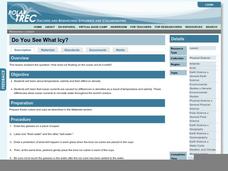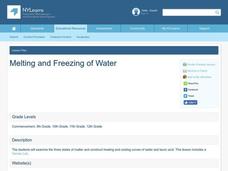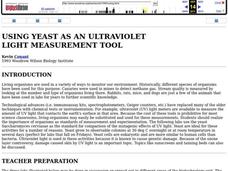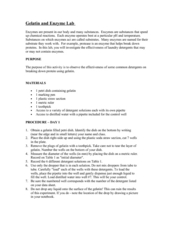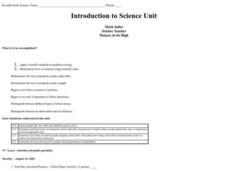Curated OER
Supernova Chemistry
Using spectroscopes, high school astronomy, physics, or chemistry learners observe emission spectra from several different sources. This stellar NASA-produced lesson plan provides terrific teacher's notes and a student handout. Make sure...
Curated OER
Dilution and Concentration of Solutions
Future chemists practice laboratory techniques by creating a monochloramine solution. The objectives are to use of dilution, 9concentration, and measurement skills and to prepare a solution that will be used in a water treatment...
NASA
Supernova Chemistry
By measuring the wavelength, frequency, and intensity of electromagnetic radiation, scientists determine the temperature, density, and composition of far away items. Scholars rotate through ten lab stations using a spectroscope at each...
Science Matters
Peanut Energy
How do humans get energy since they aren't mechanical and can't photosynthesize? Learners explore this question by relating potential energy in food to human energy levels. Scholars measure the change in mass and a change in...
Space Awareness
Oceans on the Rise
Temperature rises and land disappears! Through a lab exploration, learners understand the effect of temperature increase on water similar to the effect of global warming on our oceans. As they heat the water in a flask, they measure the...
Curated OER
The Reason for the Seasons
Students compare graphs of their data that was generated on a NASA website. In this seasons lesson students complete a lab activity.
Polar Trec
Do You See What Icy?
Here is a lesson that kicks off with a question. "How does ice floating on the ocean act as it melts?" As learners investigate this natural phenomenon, they'll discover that it has a lot to do with temperature, salinity, and the effect...
National Nanotechnology Infrastructure Network
Nanotechnology Invention and Design: Phase Changes, Energy, and Crystals
What does it take to be considered a smart material? Learners investigate the properties of Nitinol, a smart material, through a hands-on lab activity. They examine the crystal lattice structure and the conditions required for Nitinol to...
Maryland Department of Natural Resources
Eyes on Dissolved Oxygen
Learn about the factors that affect the way oxygen dissolves in salt water with a chemistry lab. After studying the molecular structure of water, young scientists figure out how aeration, temperature, and organic waste affect...
Curated OER
Thermal Energy Transfer - Conduction
Students examine how heat passes through a pane glass window. In this energy transfer instructional activity students complete a lab activity.
Curated OER
Reflection and Absorption of Light
Students use a microcomputer connected to a light sensor and temperature probe to explore the reflection and absorption of radiation for different surfaces. Students follow instructions in this guided inquiry based lab and are then asked...
Curated OER
Melting and Freezing of Water
Learners examine the three states of matter. They identify the segments of heating and cooling curves. Students analyze data and create a graph to determine the freezing and melting temperature of water.
Curated OER
Using Yeast as an Ultraviolet Light Measurement Tool
Students accurately measure the relationship between radiation dose and either survival or some genetic event such as mutation or recombination. They investigate the damage that was done to the DNA molecule as a result of exposure to...
Curated OER
Bungee Man Lab
Students explore the motion of a toy bungee jumper using the scientific method. They view a video of a bungee jumper and discuss what can be measured about a bungee jump. Students discuss the scientific mehtod and how to design an...
Curated OER
Gelatin and Enzyme Lab
Young scholars observe the effectiveness of detergents on breaking down proteins. For this investigative lesson students participate in an activity that shows how proteins are broken down in gelatin and fill out a worksheet.
Curated OER
Deliver
High schoolers measure the mass, volume, length and area of various objects. They are assigned a letter. The task is assesses students' abilities to make simple observations and measurements.
Santa Monica College
The Composition of Potassium Chlorate
The third lesson in a series of 11 begins by using thermal decomposition of potassium chlorate to determine the mass percent of oxygen. Then a second activity allows scholars to demonstrate that the resulting residue is from a...
Curated OER
Dissolved Oxygen and Photosynthesis: 1
Learners are taught that plants produce oxygen underwater, and they design an experiment that test this question. They discuss whether plants give off oxygen, and how to measure this. Students measure the increase in dissolved oxygen...
Curated OER
What Are You Eating?
Discover the calorie content of foods by observing how much heat they produce in water. If you have a calculator-based laboratory (CBL™) insturment for collecting data, then this laboratory worksheet will not need any changes. If...
Curated OER
Weather Instrument Use and Application
Eighth graders measure temperature, wind speed and pressure using Skymaster SM-28. In this earth science instructional activity, 8th graders collect data and record observations taken from outdoors. They explain why numerical values are...
Curated OER
Food Energy
Students compare the energy value of traditional foods eaten by indigenous people with those of modern commercial foods. They use a calorimeter to measure and calculate the amount of stored energy in various food types, and identify the...
Curated OER
Enzyme Lab
Learners examine the effects of specific enzymes on samples of liver tissue, muscle tissue (chicken), apples, and potatoes.
Curated OER
Urban Heat Islands: An Introduction to Energy Transfer and Transformation
Elementary school physical scientists explore kinetic mechanical energy by dropping a golf ball on different surfaces. They discuss how human made materials might react to light differently from nature made materials. This lesson plan...
Curated OER
Introduction to Science
Seventh graders investigate scientific methods to solve problems. They demonstrate creating data tables and graphs. They study the role of a scientist and the importance of safety in a science lab. They distinguish between an...






